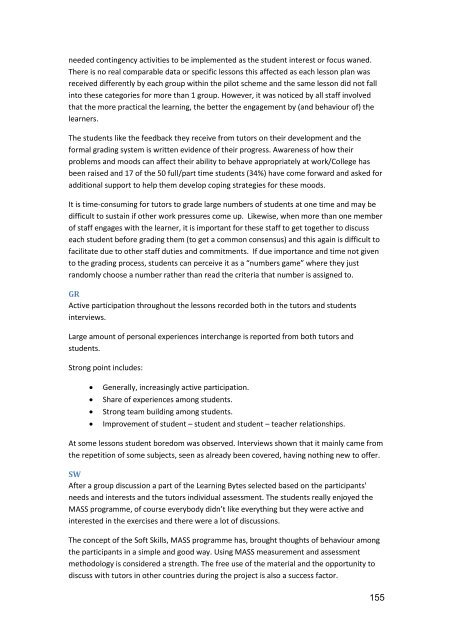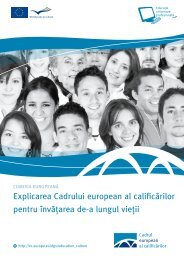Teaching and Assessing Soft Skills - MASS - Measuring and ...
Teaching and Assessing Soft Skills - MASS - Measuring and ...
Teaching and Assessing Soft Skills - MASS - Measuring and ...
You also want an ePaper? Increase the reach of your titles
YUMPU automatically turns print PDFs into web optimized ePapers that Google loves.
needed contingency activities to be implemented as the student interest or focus waned.<br />
There is no real comparable data or specific lessons this affected as each lesson plan was<br />
received differently by each group within the pilot scheme <strong>and</strong> the same lesson did not fall<br />
into these categories for more than 1 group. However, it was noticed by all staff involved<br />
that the more practical the learning, the better the engagement by (<strong>and</strong> behaviour of) the<br />
learners.<br />
The students like the feedback they receive from tutors on their development <strong>and</strong> the<br />
formal grading system is written evidence of their progress. Awareness of how their<br />
problems <strong>and</strong> moods can affect their ability to behave appropriately at work/College has<br />
been raised <strong>and</strong> 17 of the 50 full/part time students (34%) have come forward <strong>and</strong> asked for<br />
additional support to help them develop coping strategies for these moods.<br />
It is time-consuming for tutors to grade large numbers of students at one time <strong>and</strong> may be<br />
difficult to sustain if other work pressures come up. Likewise, when more than one member<br />
of staff engages with the learner, it is important for these staff to get together to discuss<br />
each student before grading them (to get a common consensus) <strong>and</strong> this again is difficult to<br />
facilitate due to other staff duties <strong>and</strong> commitments. If due importance <strong>and</strong> time not given<br />
to the grading process, students can perceive it as a “numbers game” where they just<br />
r<strong>and</strong>omly choose a number rather than read the criteria that number is assigned to.<br />
GR<br />
Active participation throughout the lessons recorded both in the tutors <strong>and</strong> students<br />
interviews.<br />
Large amount of personal experiences interchange is reported from both tutors <strong>and</strong><br />
students.<br />
Strong point includes:<br />
Generally, increasingly active participation.<br />
Share of experiences among students.<br />
Strong team building among students.<br />
Improvement of student – student <strong>and</strong> student – teacher relationships.<br />
At some lessons student boredom was observed. Interviews shown that it mainly came from<br />
the repetition of some subjects, seen as already been covered, having nothing new to offer.<br />
SW<br />
After a group discussion a part of the Learning Bytes selected based on the participants'<br />
needs <strong>and</strong> interests <strong>and</strong> the tutors individual assessment. The students really enjoyed the<br />
<strong>MASS</strong> programme, of course everybody didn’t like everything but they were active <strong>and</strong><br />
interested in the exercises <strong>and</strong> there were a lot of discussions.<br />
The concept of the <strong>Soft</strong> <strong>Skills</strong>, <strong>MASS</strong> programme has, brought thoughts of behaviour among<br />
the participants in a simple <strong>and</strong> good way. Using <strong>MASS</strong> measurement <strong>and</strong> assessment<br />
methodology is considered a strength. The free use of the material <strong>and</strong> the opportunity to<br />
discuss with tutors in other countries during the project is also a success factor.<br />
155





